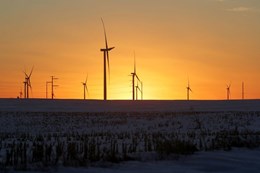-

According to the European Commission, buildings in the European Union are responsible for 40% of final energy consumption in the European Union and 36% of its energy-related greenhouse gas emissions, while 75% of the European Union’s buildings are still energy inefficient and 85-95% of the buildings that exist today will continue to exist in 2050.
-

Egypt Vision 2030 was a strategy that sought to build a nation from the grassroots level up, and a critical part of realizing this vision was to realize ambitions to make a regional energy hub. To accomplish this, national production needs to be improved and production efficiency must be enhanced to appropriate levels, taking into consideration commitments to decarbonization and global competition. Improving energy efficiency is the step that needs to be taken for the nation’s objectives to be fully realized.
-

The Australian summer is as good a time as any to make sure your fridge and freezer are in peak condition – and to buy your own thermometer
-

As the world shifts towards sustainable energy solutions, researchers are exploring innovative technologies that can efficiently convert heat into electricity.
-
.jpg?w=260&mode=crop)
The device uses special materials that change temperature when stretched or compressed, allowing it to cool the air and condense water vapor with minimal energy use.
-

Dự án SunZia, dự án năng lượng sạch lớn nhất từ trước đến nay của Mỹ, được kỳ vọng sẽ tạo ra lợi ích kinh tế trực tiếp lên đến 16 tỉ USD.
-

Nhà thờ First Presbyterian ở thị trấn Marshfield (nước Mỹ) vừa mới chính thức chuyển sang sử dụng năng lượng mặt trời, tự sản xuất điện để giảm chi phí năng lượng.
-

The U.S. Department of Energy found increasing levels of savings under a high-renewables grid across three transmission frameworks: first, accelerated transmission expansion, then point-to-point high-voltage direct current (HVDC) transmission, then HVDC using more flexibly sized multiterminal converters.
-

Schneider Electric highlights the critical need for sustainable data center design to reduce carbon emissions and enhance resilience. Through advanced digital solutions, Schneider aims to optimize energy use and drive sustainability in the data center industry.
-

The use of energy-efficient components in the design of automation systems does much more than save energy and support corporate sustainability goals.
-

In Iran, the energy sector is the largest contributor to carbon emissions.These sectors exert significant pressure on energy resources and contribute substantially to carbon emissions. Recognizing these challenges, UNDP Iran has spearheaded transformative initiatives in sustainable energy and operational efficiency at UN facilities.
-

The cutting-edge, state-backed project at 345 Hudson could be a model for other big buildings sprinting to comply with the city’s building decarbonization law.
-

From the aircraft taking you on your next trip, to the buildings you work in – learn how energy efficiency is at work all around you.
-

To limit global warming to 1.5°C, we need to cut emissions by about 7% annually. Right now, emissions are rising by 1.5% each year. Energy-related emissions contribute to more than 80% of this global total. And although renewable energy production has more than doubled in the last decade, it still makes up only slightly over 13% of total energy use, up from 9% in 2011.
-

Nova Scotia is unveiling new details on its planned public housing project. It says the bulk of the new homes will be coming to the Halifax area. As Skye Bryden-Blom reports, it’s also introducing 25 new modular units as it looks to bolster its affordable housing stock.
-

Nhằm cải thiện hiệu quả năng lượng và giảm phát thải trong ngành xi măng, E&M Combustión đã ra mắt một loại đầu đốt cải tiến trong nỗ lực tìm kiếm giải pháp bền vững cho ngành xi măng.
-

In order to protect the environment and green the chemical industry, in recent years, Vietnam Chemical Group has implemented many solutions.
-

Feeling anxious every time you receive your utilities bill? It may be time to reassess your electricity usage. Here are some energy-saving tips to help you maximise your electricity savings.
-

With insufficient awareness of the benefits of energy audits, many businesses only conduct energy audits as a response to government requests, instead of considering them as a solution to save energy, reduce production costs, protect the environment, and move towards sustainable development.
-

In March 2024, MEPs adopted plans, already agreed upon with Council, to help reduce energy consumption and greenhouse-gas emissions from the buildings sector.




.jpg?w=260&mode=crop)















 Energy Efficiency and Conservation: Technology as the “Key”
Energy Efficiency and Conservation: Technology as the “Key”
 Energy-saving solutions and green transition promotion
Energy-saving solutions and green transition promotion
 Opening of the 2025 Energy-Efficient Equipment and Green Transition Exhibition Fair
Opening of the 2025 Energy-Efficient Equipment and Green Transition Exhibition Fair
 Consultation on the methodology for developing and updating energy consumption standards for four major industrial sectors
Consultation on the methodology for developing and updating energy consumption standards for four major industrial sectors
 Develop sales and marketing strategies for energy efficiency equipment and solution suppliers
Develop sales and marketing strategies for energy efficiency equipment and solution suppliers
 The 9th VEPG Steering Committee Meeting: Strengthening Coordination for Viet Nam’s Just Energy Transition
The 9th VEPG Steering Committee Meeting: Strengthening Coordination for Viet Nam’s Just Energy Transition